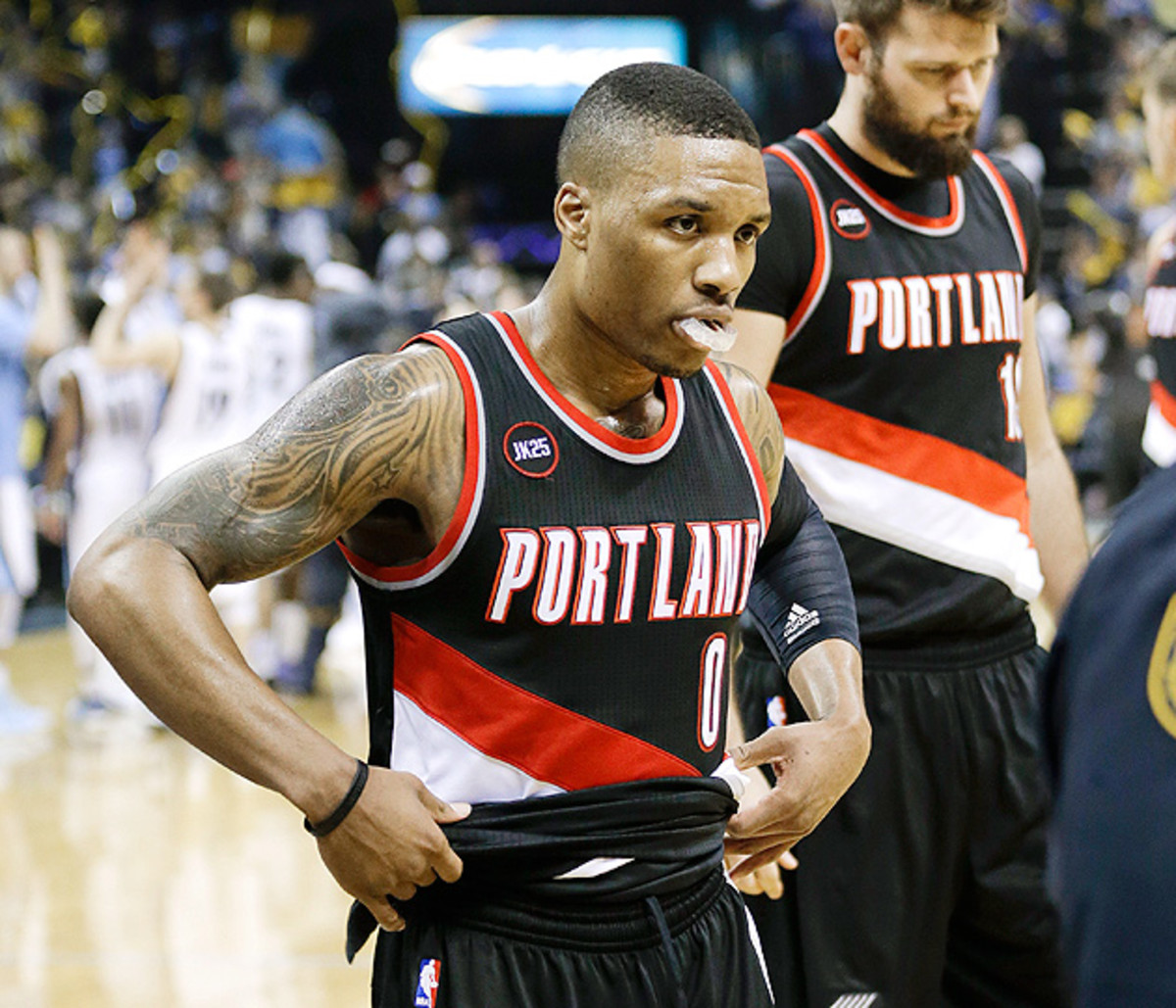Lillard struggles as Grizzlies squeeze life out of the Blazers' offense

A version of this Trail Blazers team was poised for title contention. LaMarcus Aldridge and Damian Lillard would supply the shot creation while flanked by capable shooters and willing passers. Robin Lopez and Wesley Matthews would assume leading roles in a defense impressive for its ability to stay solid, position-by-position. Together they were bound by balance and continuity—the sparks that turn talent to results.
How fragile that formula turned out to be. With Matthews done for the season, his replacement (Arron Afflalo) absent to start the playoffs and Nicolas Batum as inconsistent as ever, Portland's offensive flow has been dammed in its first-round series against Memphis. Game 2 didn't turn out to be as thoroughly one-sided as Game 1, but 39% shooting yielded a similar result: a 97-82 loss and the Grizzlies in control with a 2-0 lead.
• MORE NBA: Schedule | Grades | Awards | Playoff coverage | Finals picks
To this point, Memphis has managed to crowd and influence Portland's top scorers without committing deliberate pressure to the ball. There isn't a schemed double that Grizzlies coach Dave Joerger has thrown at Aldridge; he'll default to Zach Randolph, Marc Gasol and Kosta Koufos to body up and contest every shot individually. This is because the Blazers offense feeds off overreaction. Bring too many defenders to Aldridge and he'll pick out an open shooter on the weak side of the floor. To counter, the Grizzlies are content to stake out their posts and let the Grizzlies' role players starve.
[daily_cut.NBA]Most of the possessions used by the Blazers' supporting cast have come on the off chance of a breakdown or the more likely need to force the action. Stars can't go it alone against the Grizzlies. Yet, Aldridge has been boxed in by a defense that refuses to bend. It maintains the perimeter (Portland shot just 30% from the three-point line), guards the interior (nothing comes easy against Gasol) and uses physicality as a means of control. Only a few of the healthy Blazers can push through to score under those conditions and one of the most essential has yet to find his bearings.
Game 2 was better than Game 1 for Lillard only in the sense that he got the message. The All-Star point guard launched 21 shots in the series opener despite missing 16. He took 16 on Wednesday but still missed 11, which were a botched assortment of runners and jumpers that are typically within Lillard's power to hit. The defense's influence cannot be ignored, but a standard Lillard rut is also in play. No high-level guard rides lows quite as long as Lillard, and when those crashes hit, the current Blazers have limited means to recover.

Another opponent might be more forgiving in that regard, allowing Lillard some easier looks or reacting on the basis of his reputation rather than an insistent gameplan. The Grizzlies know better. They got by swimmingly in the regular-season series by letting Lillard and Aldridge fire away and containing the Blazers from the outside in. Thus far, they've done the same in the playoffs albeit with even more bite and discipline. There is no fear of Lillard in these games; only the hard work of an astute group of perimeter defenders to make his shots as challenging as possible.
The Craft: Zach Randolph reigns through pivots and patience
The only strategic deviant was, naturally, Tony Allen. Memphis' most belligerent defender has more room to freelance than others and has made expert use of it. Allen would swipe at Aldridge's dribble just long enough to kill his rhythm before flocking back to C.J. McCollum or Allen Crabbe for the kind of disruption that seldom registers in the box score but can run a possession off the tracks. A fully healthy, finely tuned Blazers team might be able to counter that kind of ploy with quick ball movement. Under these circumstances, Aldridge was powerless to do anything but secure the ball and either passively kick out or toss up a shot.
Those gambits are such a small part of what the Grizzlies do, yet they hit upon a fundamental truth of this series thus far: Unless the Blazers create some kind of momentum via Aldridge or Lillard, their offense clams up. There aren't enough players on the roster who can counter-drive against rotating pressure or hit shots before the defense recovers. This allows defenders like Courtney Lee and Jeff Green to play the middle ground between their assigned marks and more pressing threats. Neither leaves outright, but their shading toward the interior comes at so little cost when Batum and McCollum go a combined 1-of-10 from three-point range.
• MORE NBA: Power Rankings: Playoff edition | Highlights | Series preview
Portland won't survive this series without significant adjustments. Some teams in the postseason find themselves at a disadvantage because they've come up short in those things they do well. By cutting off the rhythmic life of the Blazers offense, the Grizzlies have made its recovery far more complicated. Their coverage has capitalized to a degree that Portland has been the single least efficient offense of the playoffs (89.2 points per 100 possessions), per NBA.com. Even the fledgling Bucks have fared better (as sobering a thought as any for the Blazers this season).
Much needs to be fixed and fast. The Blazers can keep closer with better luck on some of their open shots, though reclaiming this series will take new access points to the offense and measures to open up even basic, system-informed ball movement. Resourceful as coach Terry Stotts may be, a comeback could be beyond his powers given the resources at his disposal. The full-strength Blazers were truly a contender. In their current form and within this particular matchup, they seem to make for more of a casualty. Potential opponents beware: The Grindhouse is a violent place.
